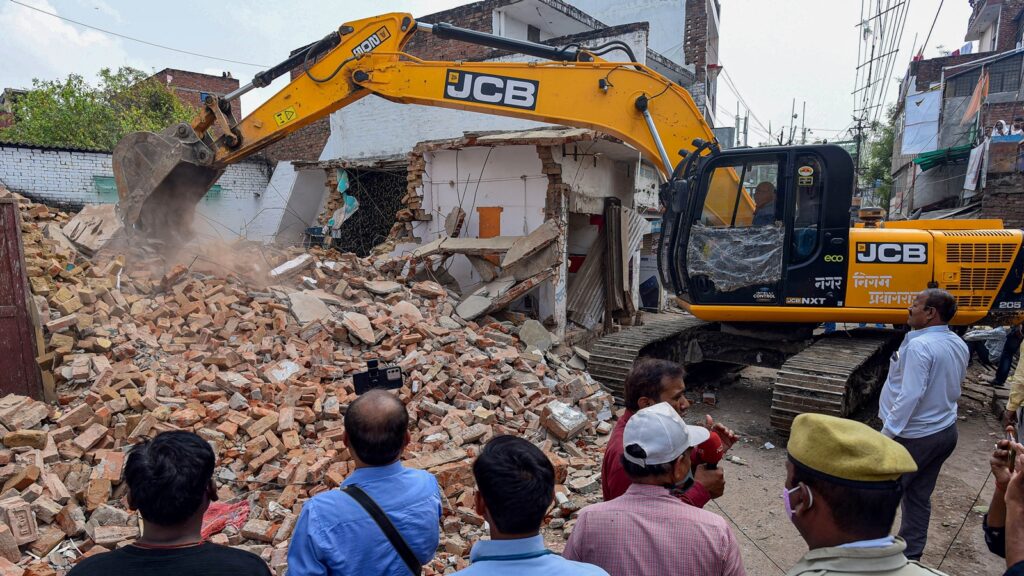Jahanvi Agarwal
The Supreme Court, on 2nd September, voiced its strong disapproval of the rising trend of demolishing properties belonging to individuals accused of crimes, referring to it as a troubling example of “bulldozer justice”. A Division Bench comprising Justices BR Gavai and KV Viswanathan expressed concerns over this practice, emphasizing that demolitions cannot be justified solely on the grounds that someone is facing criminal charges. “How can demolition be carried out just because a person is accused?” the Court questioned, highlighting the need for a more measured approach.
The Court recognized the stance taken by the State of Uttar Pradesh, which maintained that demolitions should only target illegal structures. “We appreciate the stand taken by the State of Uttar Pradesh,” the Court acknowledged, adding, “We propose to lay down some guidelines on a pan-India basis so that the concern raised is taken care of.” The Bench invited all parties involved to submit their suggestions, which Senior Advocate Nachiketa Joshi was tasked with compiling and presenting.
This hearing stems from petitions filed by Rashid Khan of Rajasthan and Mohammad Hussain of Madhya Pradesh, who both alleged that their properties were demolished without due process. Khan, a 60-year-old autorickshaw driver from Udaipur, saw his home razed by district authorities on August 17, 2024, following communal unrest sparked by a fatal stabbing incident involving his son. Similarly, Hussain claimed his house and shop were unlawfully bulldozed by state officials in Madhya Pradesh. These cases were linked to a broader petition filed by Jamiat Ulama I Hind against the demolition of Muslim homes in Haryana’s Nuh district, following inter-communal violence.
Solicitor General Tushar Mehta, representing the State of Uttar Pradesh, assured the Court that demolitions would be executed strictly within the bounds of legality, reaffirming that no property would be demolished merely because its owner is accused of a crime. “No immovable property can be demolished just because the accused is involved in a criminal offence,” Mehta stated.
Justice Gavai, agreeing with this position, indicated that the Court would formulate guidelines ensuring a structured process before any demolition takes place. These guidelines, as suggested by Justice Viswanathan, might include provisions for notice issuance, time for response, and opportunities to seek legal remedies before a demolition is carried out.
During the proceedings, Senior Advocate Dushyant Dave, representing Jamiat Ulama I Hind, recounted the controversial demolition in Delhi’s Jahangirpuri, where properties were bulldozed despite the absence of any legal authority. “On April 16, permission was sought for a protest … it was refused, yet they went ahead with the demolition,” Dave argued, pointing to the overreach of officials. Senior Advocate CU Singh also raised concerns about the arbitrary demolition of homes, some decades old, based on the alleged involvement of residents in criminal activities.
The Bench, while seeking detailed submissions for the formulation of guidelines, urged all parties to maintain decorum in the Court. “Mr. Dave, let us not turn the court into a battleground. We expect this from both sides,” Justice Gavai remarked, reflecting the Court’s desire to address the issue without unnecessary acrimony.
The Court scheduled a further hearing on the matter for the following day and granted an intervention application by the National Federation of Indian Women, represented by Advocates Nizam Pasha and Rashmi Singh.
As the Supreme Court prepares to draft comprehensive guidelines on this critical issue, it remains clear that the Court is committed to ensuring that justice is administered fairly, without resorting to arbitrary or extrajudicial measures.
Case Name: Jamiat Ulama I Hind vs. North Delhi Municipal Corporation
Case Number: Writ Petition (Civil) No. 295 of 2022
Bench: Justices BR Gavai and KV Viswanathan

